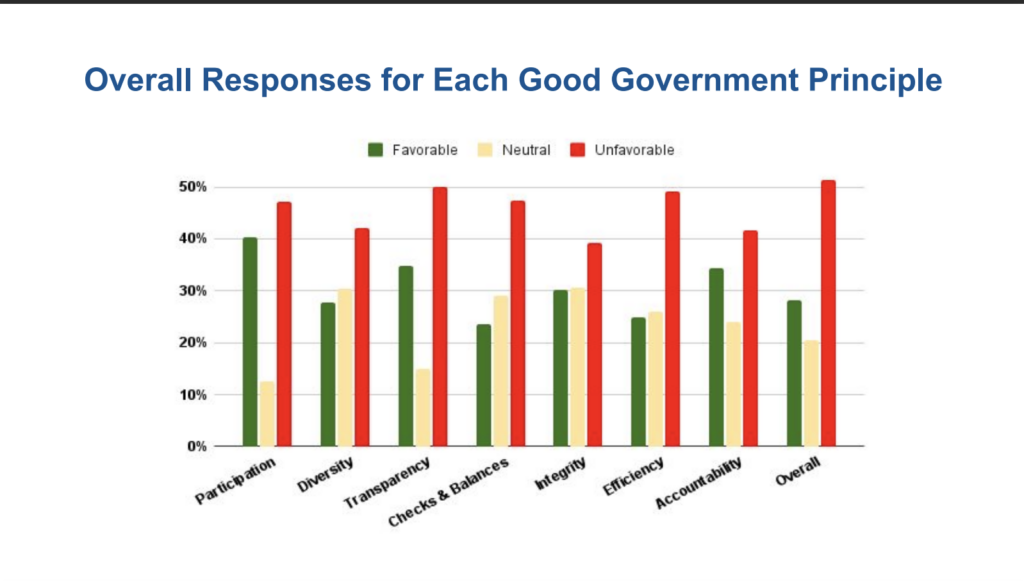Amherst Residents Raise Concerns About Local Government In League Survey On Town Charter

Photo: amherst.edu
The League of Women Voters of Amherst (LWVA) Charter Review Task Force presented the results of their survey regarding town government performance under the new Home Rule Charter at the Bangs Center on May 24. The presentation was also simulcast on Zoom. The survey, which had 405 respondents, asked residents to rate how well government under the town’s Charter measures up to the League’s Principles of Good Government. (In 2017, the new Charter was adopted by Amherst voters after a multi-year drafting process by an elected charter commission. It replaced Amherst’s Town Meeting and Select Board ,both elected, with a 13-member elected town council and an appointed town manager. Only 12 of the 351 municipalities in Massachusetts have this form of government.)
The survey task force found that more than half of the respondents to the survey have concerns about how the government is doing. It concluded that further study is warranted to ascertain whether amendments or revisions to the Charter are needed, based on League of Women Voters principles.
The task force found that more than half of the respondents to the survey have concerns about how the government is doing. It concluded that further study is warranted to ascertain which concerns are attributable to the Charter, and whether amendments or revisions to the Charter are needed based on LWVA principles. The PowerPoint presentation, summarizing the complete results of the League’s survey, can be found here.
The LWVA had voted at its 2022 annual meeting to conduct a review of the Charter in anticipation of the town’s required ten-year review in 2024. (The Charter mandates a review, managed by the Town Council ,in every year ending in a four. The Charter will have been in effect for five years when it is formally reviewed). It subsequently formed a Charter Review Task Force, chaired by LWVA Steering Committee member Phyllis Lehrer. So far, it has provided a comparison study of the 12 Massachusetts towns with a council/manager form of government and a survey of residents’ opinions about how town government is delivering on the League’s good government principles. The LWVA principles include:
- Widespread and inclusive participation
- Diversity in the community reflected in government
- Openness and full disclosure
- Checks and balances of power among the executive, legislative and administrative branches of government and the electorate
- Honesty and non-corruptibility in all decision-making
- Efficiency, based on professional management and timely decision making
The comparison study found that the council/manager towns have different numbers of councilors (Amherst’s 13 is the largest), many have much shorter lame duck periods than Amherst has (several have a two-week period), and that a large majority have amended their charters.
The Task Force’s survey, which asked respondents about each principle of good government, indicated that a plurality of respondents have concerns about Amherst government in each of the areas.
Overall, more than 50% of respondents in the survey view town government unfavorably.

About 50% have concerns about transparency in decision-making. Some of the factors respondents were asked to weigh in on were access to information about applicants for boards and committees, access to agendas, minutes, and recordings, and access to public comments.
More than 40% of respondents view town government unfavorably for efficiency, and just under 50% think the town government has not been timely in decision-making. Factors considered included meeting lengths, composition of resident committees, agendas, and term lengths.
About 51% of respondents don’t think that the town government welcomes public participation; the top area of concern involves the town budget process. Other areas of higher concern include the ability to provide public comment, resident access to the petition process, and resident access to participate and have a voice on council committees. More than 75% of respondents agreed that residents have voting access in Amherst, and respondents also rated disability and language access favorably.
About 47% of respondents think that there are insufficient checks and balances between the executive and legislative branches. Factors with a plurality of unfavorables included the power of individual councilors to cut off/postpone discussion on a matter, effective representation of the electorate by the Resident Advisory Committee, and the Council’s ability to check the Town Manager via the current goal-setting, evaluation and contract processes.
A plurality, about 40% of respondents, are concerned with the town government’s honesty/non-corruptibility.
Respondents were split on whether the community’s diversity is reflected in town government, with 27% agreeing that it is and 42% opining that it is not.
Praise For Diversity Efforts
More than 50% of respondents have a favorable view of diversity-related initiatives including the Community Responders for Equity, Safety & Service (CRESS) and the Diversity, Equity & Inclusion (DEI) Departments, and the establishment of a reparations fund.
Methods
The survey was conducted over a span of six weeks in March and April of 2023. Residents were invited to respond to the survey online. The invitation was widely distributed and included but was not limited to distribution via the League’s email list, Facebook, and Twitter accounts, the town’s Civic Engage website, local political action committees, and the Indy.
The Task Force compared the demographics of the respondents to other local surveys conducted recently (the 2023 solid waste survey and the 2023 solar survey) and found the composition of respondents to be similar in all three. In the League’s survey, the vast majority of respondents were homeowners (only 5% were renters), white (71%), and older (56% over age 65). )
The League’s Charter Review Survey Results Presentation can be found here.

when will amherst prioritize paying teachers, fixing roads?
we seem to find funds for a much needed school project, hoorah!!
expand a fully functioning library with an off the charts cost.
and the basics need are left with the crumbs.
expand —> demolish large parts of and expand atop the rubble
I am not one of the 400+ respondents who completed the survey. I started to fill it out, but it was so poorly written that the choices given didn’t align with my opinion and that answers could be misinterpreted. I hope in future that the League has trained professionals write their surveys, especially on such important topics.